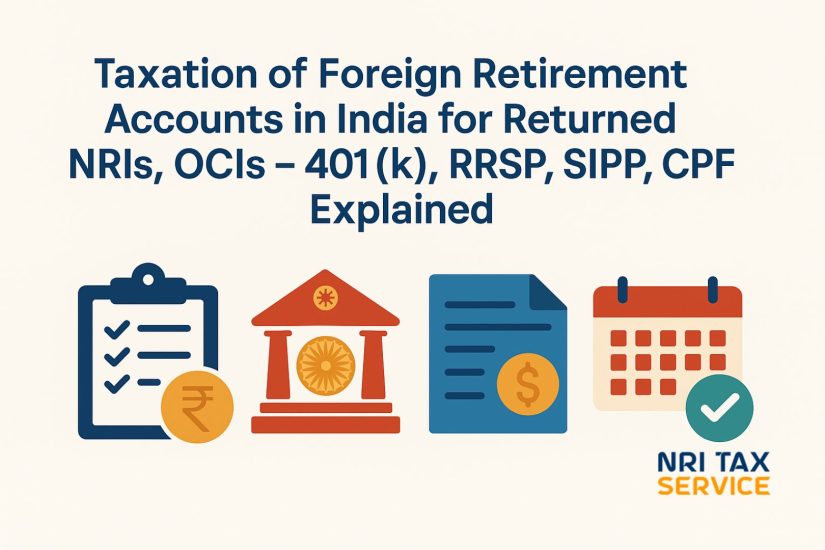Taxability of Foreign Retirement Saving Plan Accounts in India – Returned NRIs, OCIs – A Detailed Analysis
Many Indians, who live and work abroad, contribute to various employer sponsored retirement saving accounts such as the Roth and Traditional 401(k) accounts in USA, Superannuation Retirement Fund Accounts (Canada, Australia), RRSP (Canada), CPF (Singapore), SIPP (UK) etc. When these Indians return back to India, taxation of income from these retirement plan boggle a big question in the mind of returning NRIs i.e. what will be taxability of these as per Indian tax law? In this article, it is tried to provide a detailed overview of the tax implications, relief provisions, key principles, DTAA provisions, disclosure/reporting in ITR in relation to foreign retirement plans income in India.
Legal Taxation Framework in India: Income Tax Act, 1961
In relation to foreign income, Indian taxation revolves around residential status of a person. Hence, if a person is Non-Resident/Not Ordinary Resident (NOR) then his/her foreign income is not taxable in India. However, if that person is Ordinary Resident in India (ROR) then his/her global income becomes taxable in India. Hence, income from foreign retirement schemes is taxable in India in case of a person is ROR. Further, there is no clarity under Indian Tax laws to tax the Principal/Corpus and Regular Earnings (i.e. Interest, Dividend, Capital Gains in these accounts). However, as per the normal provisions of taxation, taxability may be categorized according to the nature of income and at the time the income transaction taking place.
Various Type Of Retirement Accounts Abroad
There are different type of Retirement Saving Schemes in foreign countries. The prominent employer sponsored saving plan schemes are as under
- 401(k) Traditional/Roth, IRA – United Sates of America
- RRSP (Registered Retirement Saving Plan) – Canada
- SIPP (Self-Invested Personal Pension) – United Kingdom
- CPF (Central Provident Fund) – Singapore
- Superannuation Fund – Australia
Tax Relief for Foreign Retirement Plans Income In India – Sec 89A, Rule 21AAA
To align Indian laws tax timing with foreign countries, wef 2022-23 assessment year, Govt of India has inserted section 89A and Rule 21AAA in Income Tax Regulations. Purpose of these section & rules is to defer the taxation in India and tax it in the year when it is taxable in Foreign countries i.e. at the time of withdrawal/redemption. These provisions are not mandatory but is optional for taxpayer. To opt these provisions taxpayer need to file a form 10EE with requisite details therein. This form has to be filed before the due date of filing of ITR.
Notified Country – To Avail Benefit of Rule 21AAA
The benefit of Rule 21AA provision is presently applicable to notified countries only. As per section 89A, notified countries are USA, UK, Canada. Hence, this benefit cannot be claimed by returned NRIs whose account is maintained in other countries like Australia, Singapore etc. Those can find out the provisions of DTAA to avail benefit if any.
Information To Be Provided In Form 10EE (Rule 21AAA)
If a person opts rule 21AAA, he has to file Form 10EE. This form has to be submitted before the due date of filing of ITR. Once this form is filed rule 21AAA provision will apply and tax on foreign employer sponsored retirement schemes will be applicable at the time of withdrawal from these schemes. While submitting the Form 10EE, taxpayer needs to provide various information in relation to foreign specified account, which include
- Personal details of taxpayer (including residential status)
- Notified Country where retirement account is maintained (i.e. USA, Canada, UK)
- Specified Retirement Account details i.e. A/c Name, Number, etc
- Name of Financial Organisation where account is maintained
- Account opening date
- Balance in the account on the last date of preceding year in which option of rule 21AAA is applied
- Eligibility year of withdrawal from the specified account
- Nature of income from this account as per other country tax rules
- Basis of taxation in foreign country on the withdrawal income
Deductions Allowed In India From Foreign Retirement Account Withdrawals
Rule 21AAA allows some deductions also from this account income at the time of withdrawal/redemption when it is taxable in India as per this rule. Deduction is allowed for that part of the fund which is earned at the time when taxpayer was a Non-Resident/Not Ordinary Resident in India. Further, deduction is also available for that part of income which is already taxed in India (i.e years for which taxpayer has not opted benefit of Rule 21AAA).
Disclosure/Reporting of Foreign Account in ITR
Under the provisions of Income Tax Act and Black Money Act 2015, Ordinary Residents (ROR) are under obligation to disclose their foreign assets and income in the ITR in FA Schedule of ITR. This disclosure is mandatory under Black Money Act else penalty provisions (Rs 10 Lakh per year) will attract on non-reporting or mis reporting of Foreign Accounts (including Retirement Schemes) in the ITR. This reporting has to be made even if form 10EE is filed under Rule 21AAA to defer the taxation of income from Foreign Retirement Account.
NRI Tax Service Services In Relation To Foreign Retirement Account Taxation In India
NRI Tax Service, having offices PAN India i.e. Delhi NCR, Bangalore, Hyderabad, Kolkata, Chennai, Gujarat, Punjab, Uttar Pradesh, etc, provide various services in relation to Foreign Funds Taxation in India. Some of the services are
- Advising in relation to taxation provisions in India
- Preparing and filing of Form 10EE
- Cost-benefit analysis of Sec 89A/Rule 21AAA Taxation Vs Normal Taxation
- Claiming Foreign Tax Credit in India ITR against tax payable in India
- Reviewing & analysing Tax Treaties (DTAA) Impact
- Reporting of these funds in ITR (Foreign Asset Schedule) in India
- Understanding the applicability of provisions of 89A/Rule 21AAA on these saving plans
Foreign Retirement Fund Accounts – Taxability in India – Returned NRIs, OCIs






